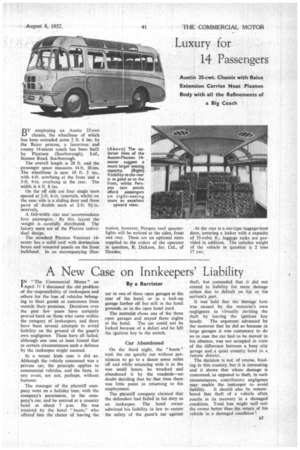A New Case on Innkeepers' Liability
Page 41

If you've noticed an error in this article please click here to report it so we can fix it.
By a Barrister
'11■4 "The Commercial Motor" on IN
11! discussed the old problem 11! discussed the old problem
of the-responsibility of innkeepers and others for the loss of vehicles belonging to their, guests or customers from outside their premises. Decisions over the past few years have certainly proved hard on those who came within the category of innkeepers, and there have been several attempts to avoid liability on the ground of the guest's own negligence. These have all failed, although one ease at least hinted that in certain circumstances such a defence by the innkeeper might succeed.
In a recent Irish case it did so. Although the vehicle concerned was a private car, the principle applies to commercial vehicles, and the facts, in any event, are not, perhaps, without humour.
The manager of the plaintiff company went on a holiday tour, with the company's permission, in the company's car, and he arrived at a country hotel at about 7 p.m. He was received by the .hotel " boots," who offered him the choice of leaving the car in one of three open garages at the rear of the hotel, or in a lock-up garage farther off but still in the hotel grounds, or in the open hotel yard.
The motorist chose one of the three ,open garages and stayed three nights at the hotel. The car could not be locked because of a defect and he left the ignition key in the switch.
Car Abandoned On the third night, the "boots" took the car quietly out without permission to go to a dance some miles off and while returning with it in the wee small hours, he wrecked and abandoned it by the roadside—no doubt deciding that by that time there was little point in returning to his employment.
The plaintiff company claimed that the defendant had failed in his duty as an innkeeper. The hotel owner admitted his liability in law to ensure the safety of the guest's car against theft, but contended that it did not extend to liability for mere damage unless due to default on his or his servant's part..
It was held that the damage here was caused by the motorist's own negligence in virtually inviting the theft by leaving the ignition key handy. The argument advanced by the motorist that he did so because in large garages it was customary to do so in case the car had to be moved in his absence, was not accepted in view of the difference between a busy city garage and.a quiet country hotel in a remote district.
The decision is not, of course, binding in this country, but it is interesting and it shows that where damage is concerned, as opposed to theft, in such . circumstances, contributory negligence may enable the innkeeper to avoid
liability. It should also be remembered that theft of a vehicle often results in its recovery in a damaged condition. Total loss might well suit the owner better than the.return of his vehicle in a damaged condition .!




















































































